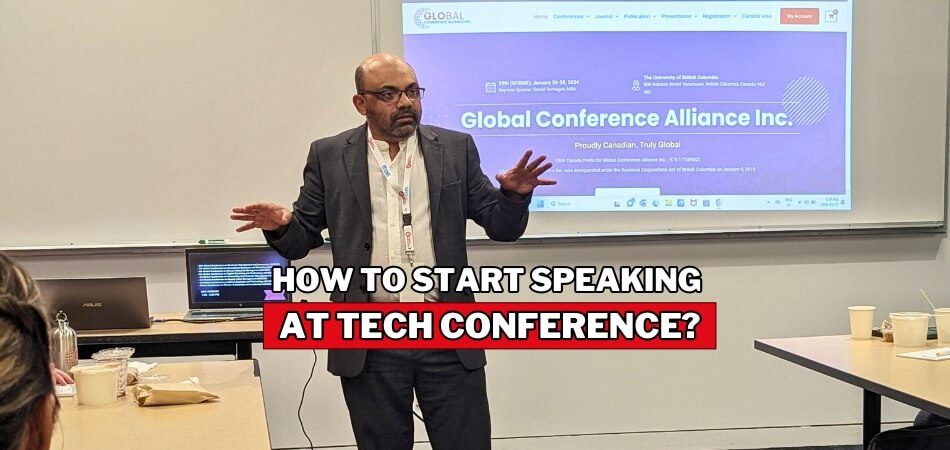Having the opportunity to speak at a tech conference can immensely boost your professional profile, giving you a chance to share your expertise and insights. This allows you to network with like-minded professionals and influencers in the tech industry, which could lead to new opportunities. You’ve come to the right place if you’ve wondered, “How do I start speaking at a tech conference?”
You can begin by identifying your area of expertise, and then find conferences that match to your interests. Prepare a strong proposal or abstract that highlights your topic’s value and uniqueness. Networking with conference organizers and attendees is also crucial. Additionally, raise your presentation skills and keep abreast of industry trends to ensure your talk is both engaging and informative.
Continuing reading the article will provide you with an in-depth insight into managing this exciting opportunity.
A Basic Overview of Tech Conference Speech
The opportunity to learn and network is immense at a tech conference. These events bring together thought leaders and innovators from various sectors. During the conference, you’ll get a chance to hear about the latest technologies and trends in the industry.

By participating in upcoming conferences related to technology from overseas, you will have the opportunity to share your insights through a well-prepared speech. Besides enhancing your professional visibility, this experience allows for significant personal growth as well. By sharing your experiences, you engage an audience that wants to learn.
The delivery of a speech at such a conference requires clear communication and a structured presentation. You need to articulate your points effectively to capture and retain the audience’s attention. It’s a rewarding experience that can establish you as a thought leader in your field.
Speaking at Technology Conferences- What Motivates One?
Tech conferences are vibrant hubs for knowledge exchange and innovation, attracting individuals from a variety of tech backgrounds. The events aren’t just about learning; they are also an opportunity to grow personally and professionally. Speaking at these conferences can offer numerous benefits, motivating many to take the stage.
- Professional Visibility: Presenting at tech conferences boosts your professional profile. It positions you as a thought leader in your field.
- Networking Opportunities: You will meet like-minded professionals and potential collaborators. Such interactions can lead to exciting career opportunities.
- Sharing Knowledge: It allows you to share insights and breakthroughs. This sharing contributes to the tech community’s growth.
- Learning Experience: Speaking engagements are a two-way street. The feedback you receive from the audience allows you to gain new perspectives and insights.
- Personal Development: Preparing and delivering speeches raise your professional development and communication skills. It boosts confidence in public speaking and presentations.
- Inspiring Others: Your journey and knowledge can inspire and empower others. Such contributions enable a supportive tech community.
Taking the stage at technology conferences is more than just a speaking slot; it’s a chance to influence and connect. Whether you’re looking to advance your career or inspire others, the platform offers significant opportunities to make a mark.
How Do I Start Speaking at a Tech Conference?
Speaking at a tech conference can be a career-defining moment, offering unparalleled opportunities to share insights and expand your network. If you’re looking to share your knowledge and connect with industry leaders, speaking at a tech conference is an excellent option.
Here’s the process to begin your speaking journey:
Step 1: Identify Your Niche
Identify the unique expertise or insights you can provide. Focus on areas where you can provide valuable contributions or unique perspectives. This specificity will help your proposals stand out to conference organizers.
Step 2: Research Conferences
Look for conferences that align with your expertise and professional goals. Consider the audience, the theme, and the speakers they host. This research will ensure you choose the right venue for your debut.
Step 3: Write Your Proposal
Develop a compelling proposal that outlines the value and uniqueness of your presentation. Ensure it addresses the conference theme and highlights how your talk will benefit attendees. Your proposal is your first impression, so make it count.
Step 4: Practice Your Presentation
Once your proposal is accepted, refine your presentation. Practice regularly to boost your delivery and ensure your talk fits within the allotted time. Consider using visuals or interactive elements to engage your audience.
Step 5: Network and Follow Up
During the conference, engage with other speakers and attendees. Networking can open doors to more speaking opportunities and collaborations. After the event, follow up with contacts and seek feedback on your presentation to improve next time.
Step 6: Gather Feedback and Reflect
After delivering your presentation, gather feedback from attendees, organizers, or mentors to learn how your message was received. This feedback offers valuable insights to refine your approach for future talks. If it was your first experience speaking at large conferences, reflecting on what went well and identifying areas for improvement is crucial. Taking part in continuous learning will help you improve your skills and make a more significant impact in future presentations.
Step 7: Share Your Experience Publicly
Amplify your reach by sharing highlights, insights, or reflections from your presentation on social media, a blog, or a professional network like LinkedIn. This can expand your audience beyond the event and establish you as a thought leader in your field. Showcasing your experience also increases visibility and credibility, opening doors for additional speaking engagements.
Beginning your journey as a tech conference speaker is an exciting opportunity to grow professionally and personally. By following these steps, you’ll be well on your way to making a meaningful impact on your audience and your career.
Types of Topics You Can Address with Your Speech
An engaging presentation can be achieved by selecting the right topic for a tech conference. Choose a topic that highlights your expertise while also capturing the attention of attendees. Here are some diverse topics you might consider for your speech to make an impact:
Emerging Technologies
Explore advanced technologies that shape the future. Discuss their potential applications and challenges. This topic attracts tech enthusiasts eager to stay ahead. It also sparks conversations about ethical implications and sustainability.
Cybersecurity Trends
With digital threats evolving, there’s always something relevant to discuss cybersecurity. Highlight recent breaches, their impact, and preventive measures. This topic is critical for professionals aiming to safeguard their operations. It also underscores the importance of ongoing education in cybersecurity practices.
AI and Machine Learning
Find out how AI and machine learning are revolutionizing industries. Explain their role in data analysis and decision-making processes. This is a chance to demystify complex algorithms for a broader audience. You could also predict future AI development trends.
Tech in Healthcare
Focus on technology’s transformative impact on healthcare. Discuss telemedicine, wearable devices, and AI in diagnostics. This topic appeals to a wide range of professionals, from healthcare providers to tech developers. It highlights tech’s role in improving patient care and healthcare efficiencies.
Sustainable Tech Solutions
Discuss the role of technology in promoting sustainability. Explore innovations in energy-efficient technologies and their implementation. This topic is increasingly relevant as more companies commit to environmental responsibility. It also offers a platform for discussing regulatory impacts and economic incentives.
Do Conference Speakers Get Paid Handsome Amounts?
Yes, conference speakers sometimes receive generous compensation, though it varies widely. Some high-profile tech conferences, particularly software-focused ones, pay experienced speakers handsomely. However, smaller events or those hosted by nonprofits may offer less, sometimes just covering travel costs.
Many software conferences attract industry experts who provide unique insights, contributing to event value. In that case, compensation for software conference speakers often depends on their expertise, audience size, and event budget. Larger conferences tend to pay more, aiming to attract reputable voices to boost attendance and engagement.
Speakers also gain other rewards, like networking, industry exposure, and professional growth, even if the direct pay is modest. Some speakers see these opportunities as valuable career investments. Finally, pay varies, but benefits beyond money often make speaking a worthwhile pursuit.
Speaking at Tech Conferences- Tips to Avoid Mistakes
The opportunity to speak at tech conferences allows you to share your expertise and network with others in the industry. However, approach this platform with preparation to avoid common pitfalls. Here are several tips to help you deliver a flawless presentation and maximize your impact:
- Know Your Audience: Tailor your speech to your attendees’ interests and expertise levels. This ensures your message resonates and maintains engagement.
- Keep Time Constraints in Mind: Plan your presentation to fit within the allotted time. Practising beforehand helps you stay on track and respect the audience’s time.
- Use Clear Visuals: Support your points with clean, understandable visuals. Overcomplicated slides can distract and confuse your audience, undermining your message.
- Check Your Tech: Verify all technical equipment before your presentation. Avoid technical glitches by familiarizing yourself with the setup and having backups ready.
- Rehearse Thoroughly: Practice your speech multiple times in different scenarios. Rehearsing smooths out rough patches and builds confidence.
- Engage the Audience: Include interactive elements or thought-provoking questions to keep the audience interested. Engagement is the key to a memorable presentation.
Frequently Asked Questions (FAQs)
Here are some of the FAQs and their relevant answers for a clear understanding of how to start speaking at tech conferences:
Do Speakers Get Paid?
Yes, many tech conferences offer compensation to their speakers, which can include a speaker fee, travel expenses, and accommodations. However, some conferences, especially smaller ones or those focused on community building, may not offer monetary compensation.
How Do I Get Hired as A Speaker?
To get hired as a speaker at a tech conference, you can start by building a strong personal brand in your field, networking with conference organizers, and showcasing your expertise through speaking engagements, blog posts, and social media.
Can I Speak at A Tech Conference if I’m Not a Tech Expert?
Yes, tech conferences often welcome speakers from diverse backgrounds, including those who may not be traditional tech experts. If you have unique insights, experiences, or perspectives to share related to the tech industry, you can still be considered as a speaker.
Do I Need to Have Previous Speaking Experience?
While previous speaking experience can be beneficial, it is not always necessary to start speaking at tech conferences. If you have valuable insights or expertise to share, you can still be considered as a speaker.
How Far in Advance Should I Submit My Speaker Proposal?
It is advisable to submit your speaker proposal as early as possible, as many conferences have limited speaking slots available and fill up quickly. Aim to submit your proposal at least a few months before the conference date.
What Should I Do if My Speaker Proposal Is Rejected?
If your speaker proposal is rejected, don’t be discouraged. Use the feedback provided by the conference organizers to improve your proposal, consider submitting to other conferences, and continue to build your expertise and reputation in your field.
Bottom Line
Our exploration of becoming a speaker at tech conferences reveals it as a strategic and enriching pursuit. It starts with pinpointing your unique expertise and aligning it with suitable conferences.
As you consider the question “How do I start speaking at a tech conference?”, keep in mind the importance of a well-written proposal. This step showcases your topic’s uniqueness but also sets the stage for your presentation.
Finalizing your speech with diligent preparation and networking effectively at the event can significantly boost your professional development. Each interaction and presentation builds your credibility and expands your influence within the tech community.







